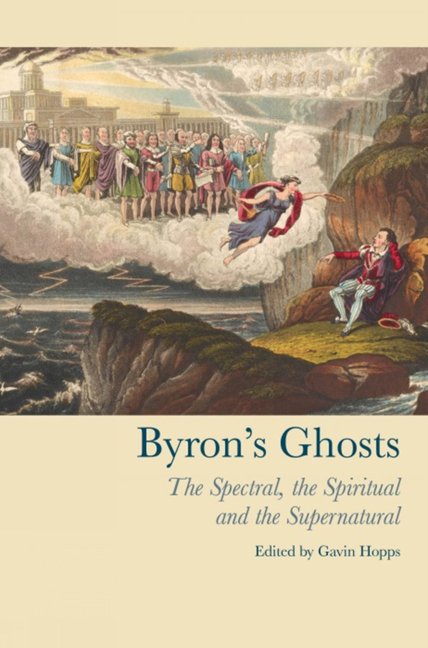Book contents
- Frontmatter
- Dedication
- Contents
- Acknowledgements
- Texts and Abbreviations
- Introduction: The Re-Enchantment of Romanticism
- Chapter 1 Determining Unknown Modes of Being: A Map of Byron's Ghosts and Spirits
- Chapter 2 Shades of Being: Byron and the Trespassing of Ontology
- Chapter 3 Byron and the Noonday Demons
- Chapter 4 Conjuration and Exorcism: Byron's Spectral Rhetoric
- Chapter 5 Byron avec Sade: Material and Spectral Violence in Childe Harold's Pilgrimage Canto IV
- Chapter 6 ‘’Twixt Life and Death’: Childe Harold's Pilgrimage, Don Juan and the Sublime
- Chapter 7 Byron, Ann Radcliffe and the Religious Implications of the Explained Supernatural in Don Juan
- Chapter 8 The Haunting of Don Juan
- Chapter 9 Being neither Here nor There: Byron and the Art of Flirtation
- Afterword: Blowing on a Dead Man's Embers: Byron's Biographical Ghosts
- Bibliography
- Notes on Contributors
- Index
Chapter 4 - Conjuration and Exorcism: Byron's Spectral Rhetoric
- Frontmatter
- Dedication
- Contents
- Acknowledgements
- Texts and Abbreviations
- Introduction: The Re-Enchantment of Romanticism
- Chapter 1 Determining Unknown Modes of Being: A Map of Byron's Ghosts and Spirits
- Chapter 2 Shades of Being: Byron and the Trespassing of Ontology
- Chapter 3 Byron and the Noonday Demons
- Chapter 4 Conjuration and Exorcism: Byron's Spectral Rhetoric
- Chapter 5 Byron avec Sade: Material and Spectral Violence in Childe Harold's Pilgrimage Canto IV
- Chapter 6 ‘’Twixt Life and Death’: Childe Harold's Pilgrimage, Don Juan and the Sublime
- Chapter 7 Byron, Ann Radcliffe and the Religious Implications of the Explained Supernatural in Don Juan
- Chapter 8 The Haunting of Don Juan
- Chapter 9 Being neither Here nor There: Byron and the Art of Flirtation
- Afterword: Blowing on a Dead Man's Embers: Byron's Biographical Ghosts
- Bibliography
- Notes on Contributors
- Index
Summary
In 1880, over half a century after Byron's death, one Quevedo Redivivus published in london his Spiritual Interview with Lord Byron […] With Some Interesting Information About the Spirit World. With Notes Explanatory and Elucidatory, a half-serious, half-tongue-in-cheek account of his encounter with the poet's ghost. Signing himself ‘Qeuvedo Redivivus’ – the nom de plume that Byron himself used in The Vision of Judgment – the writer of this short anti-Spiritualist tract conjures up through his choice of authorial pseudonym the spectre of what was already, in Byron's poem of 1822, the ghost of a poetic identity in the figure of Franciso de Quevedo, the Baroque spanish poet and politician, whom Byron's satirical jesting in the poem had purported to restore to life. As Susan J. Wolfson has pointed out, Byron's resuscitation of Quevedo in The Vision of Judgment is only one instance of the poet's concerted ‘ghosting’ of his own poetic authority, not only in this poem, but at seminal moments throughout his verse, to the extent that, behind the spectral Junius, who makes his appearance in stanza 73, we might descry none other than the figure of the anti-monarchical Byron himself – the ghostly poet who simultaneously masks and discloses himself through the name of one who signed his own anti-Hanoverian rants as ‘stat nominis umbra’. Once translated and decrypted as ‘the shadow of a name [who] stands here’, it is easy to see that the historical Junius's peculiarly spectral mode of authorial inscription is rendered strikingly literal in the context of Byron's poem: tall, thin and grey-haired, the Shadow of Junius, we are told, ‘look'd as it had been a shade on earth’ (75); ‘The man’, the poem continues, ‘was a phantasmagoria in / Himself – he was so volatile and thin!’ (77). Culturally consigned to pseudo-nymity, marginality and invisibility while yet alive, the poets Quevedo and Junius, invoked by Byron in The Vision of Judgment as his noble spectral ancestors within the same oppositional line of political and aesthetic practice, have been relegated to the realm of the ghostly long before their actual deaths.
- Type
- Chapter
- Information
- Byron's GhostsThe Spectral, the Spiritual and the Supernatural, pp. 97 - 130Publisher: Liverpool University PressPrint publication year: 2013



